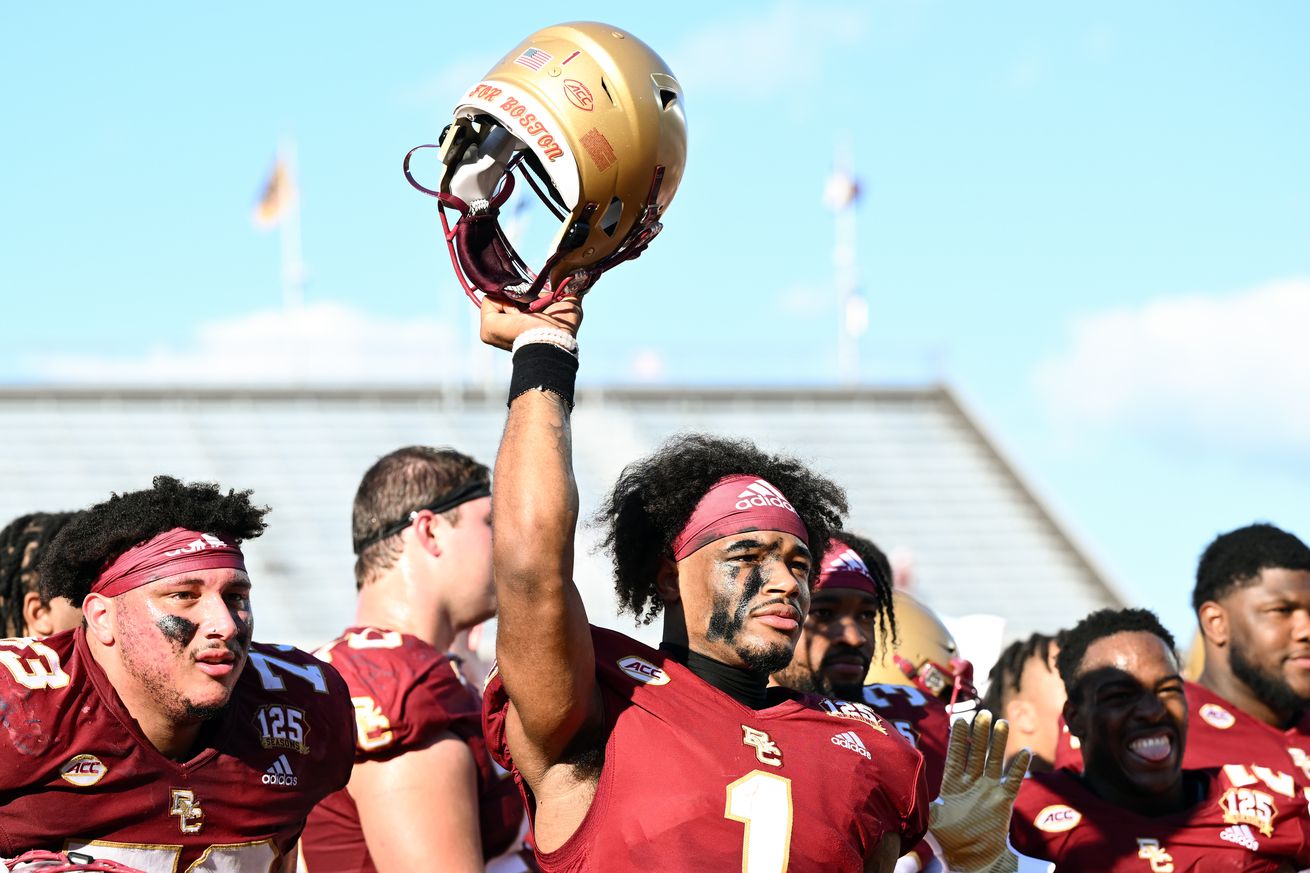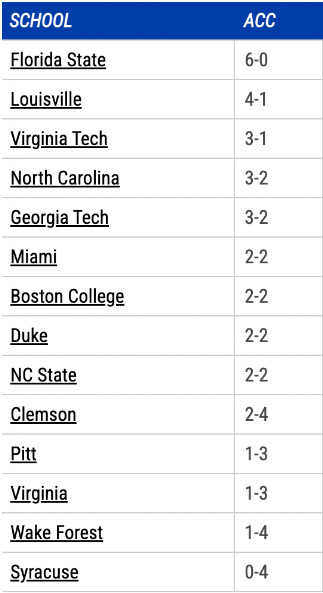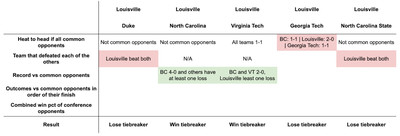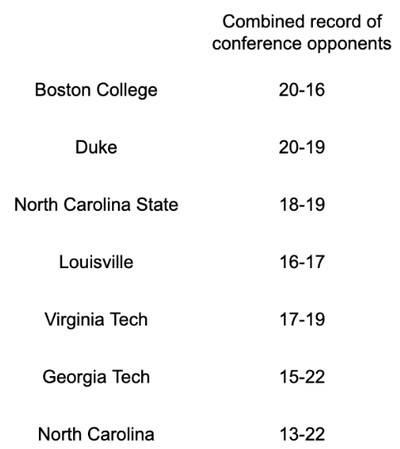
Do you believe in miracles?
(Huge shoutout to Jamie DeAntonis, who researched and wrote this piece for BCI!)
With November approaching, it’s time to start looking at what teams need to do in order to make the ACC championship game. In the old divisional format, BC fans got used to being mostly eliminated by now, as there was always an elite Clemson or Florida State team blocking us out. In the new division-less format, the league’s standout team no longer blocks BC, as they can compete against the rest of the conference for the number two spot. Because of this, we’re in the hunt despite being pretty similar in caliber to many other recent BC teams. Let’s dive in for what hopefully becomes a yearly exercise of analyzing what needs to happen for BC to get to Charlotte.

Step 1: BC wins out
In the current standings, Florida State is the lone no-loss team, and for now we can assume the near-certain result that they’ll finish ahead of BC in the standings. BC probably needs to win out to finish second, so we’ll assume that happens as well. If BC loses, or FSU theoretically crumbles, we can reassess things, but at this point BC’s most realistic path is to go undefeated in November and secure a berth as the second place ACC finisher.
If BC wins out, they eliminate Clemson, Pitt, Virginia, Wake Forest and Syracuse. They’ll also hand Miami its third loss, eliminating them, and Virginia Tech its second. This leaves one-loss Louisville and two-loss Virginia Tech, Georgia Tech, North Carolina, Duke and NC State as the remaining teams able to spoil BC’s 6-2 finish.
Step 2a (unlikely): Louisville loses two more games and Virginia Tech (save the BC game which we already assume is a BC win), Georgia Tech, North Carolina, Duke and NC State all lose at least one more game.
In this scenario, BC winds up completely alone in second place. It’s worth recognizing as a possibility, but it’s unlikely for all of these things to happen. For the rest of this post, I’m going to assume an outcome where BC finishes in a tie for second, at 6-2, with at least one other team.
Step 2b (more likely): Louisville loses at least one more game and BC wins a tiebreaker against at least one of Louisville, Virginia Tech, Georgia Tech, North Carolina, Duke and NC State
Since Louisville is unlikely to lose two more games, and there are so many two-loss teams, there will likely be at least one other 6-2 team in a tie. Here are the ACC’s current tiebreaker rules:
For two-way ties:
- Head-to-head competition between the two tied teams.
- Win-percentage versus all common opponents.
- Win-percentage versus common opponents based upon their order of finish (overall conference win-percentage, with ties broken) and proceeding through other common opponents based upon their order of finish.
- Combined win-percentage of conference opponents.
- The tied team with the higher ranking by the Team Rating Score metric provided by SportSource Analytics following the conclusion of regular season games.
- The representative shall be chosen by a draw as administered by the Commissioner of Commissioner’s designee.
For three-or-more-way ties:
- Combined head-to-head win-percentage among the tied teams if all tied teams are common opponents.
- If all the tied teams are not common opponents, the tied team that defeated each of the other tied teams.
- Win-percentage versus all common opponents.
- Win-percentage versus common opponents based upon their order of finish (overall conference win-percentage, with ties broken) and proceeding through other common opponents based upon their order of finish.
- Combined win-percentage of conference opponents.
- The tied team with the highest ranking by the Team Rating Score metric provided by SportSource Analytics following the conclusion of regular season games.
- The representative shall be chosen by a draw as administered by the Commissioner of Commissioner’s designee.
Under these rules, this is how BC would stack up by opponent:
Two-way ties:

Three-way ties with Louisville and one other team:

Other three-way ties:

Quick aside on combined win percentage of conference opponents:
The opponent combined win percentage has a lot of moving parts, and will change based on subtle game results, but below are the current standings. BC currently leads the pack, but several key teams are right behind, including Duke, which comes into play in many tiebreakers including them, and Louisville, which could impact some four-team tiebreakers. Because of this, BC will have rooting interest in some otherwise inconsequential games down the stretch.

Takeaways
In short, the two- and three-way ties that BC wins are
- North Carolina
- Virginia Tech
- Georgia Tech
- Louisville and North Carolina
- Louisville and Virginia Tech
- North Carolina and Virginia Tech
- North Carolina and Georgia Tech
- Virginia Tech and Georgia Tech
And depending on how common opponent win percentages play out, maybe
- Duke
- NC State
- Duke and Georgia Tech
- Duke and NC State
- Georgia Tech and NC State
BC fans should root for one of these results, and should probably focus in particular on the ties with Louisville and North Carolina or Louisville and Virginia Tech, since Louisville is unlikely to lose two more games.
And so, Virginia Tech and North Carolina are our best friends over the next month. Even if we ended up in a four-way tie with both of them and Louisville, we would still win it (our common opponents are Pitt and Virginia, which eliminates Louisville and UNC, and we win the two-way with VT by beating them head-to-head). BC fans should be hoping that VT and/or UNC win out the rest of the way, obviously except for VT’s game against BC.
Rooting guide for week 10
Boston College over Syracuse
- Importance: extremely high
- Impact: with any loss, our chances become very slim and we start needing lots of unlikely things to happen
Virginia Tech over Louisville
- Importance: high
- Impact: this is the most important non-BC game left on the schedule. At the moment, we want both Virginia Tech to win and Louisville to lose, and this game is an opportunity to do both at once
Miami over NC State
- Importance: medium
- Impact: there are three small reasons to root for this outcome. First, while we mostly beat NC State in tiebreakers, it doesn’t hurt to have them out of the picture. Second, since Miami is one of our opponents and NC State is one of Duke’s, our tiebreaker-deciding 1.5 game lead in opponent win percentages is affected by this game. Third, this helps in hedging for the case that BC finishes 3-1
Wake Forest over Duke
- Importance: medium
- Impact: Duke winning out doesn’t really help us in any case, and there are some cases where it hurts. It’d be nice if Wake knocks Duke out of the picture.
Florida State over Pitt
- Importance: low
- Impact: this game has a couple conflicting but relatively unimportant incentives. If Pitt wins, Florida State would be just a Miami loss away from being part of the tiebreaker, which could improve BC’s chances. If Florida State wins, BC widens a small lead in opponent win percentage against Louisville, which could come into play in some four-way ties. FSU probably wouldn’t lose to Miami, so I’ll take the bump in opponent win percentage
Georgia Tech over Virginia
- Importance: low
- Impact: this game doesn’t matter too much, and either result here is ok in my opinion. First, we don’t care too much about whether Georgia Tech is an added presence in any tiebreakers. On the one hand, Tech losing is a hedge against the possibility of a BC loss. On the other hand, a Tech win would widen our lead in opponent win percentage on Duke, Virginia Tech and NC State. I’m taking Georgia Tech because this would matter in several tiebreakers. All that said, I don’t think this game matters very much and there are arguments for rooting for either result
At this point, Florida State and Louisville are undoubtedly the frontrunners, but BC still has a fairly plausible path themselves. As long as BC has any hope, we can keep tracking what needs to happen. Hopefully this weekend works out well for us.